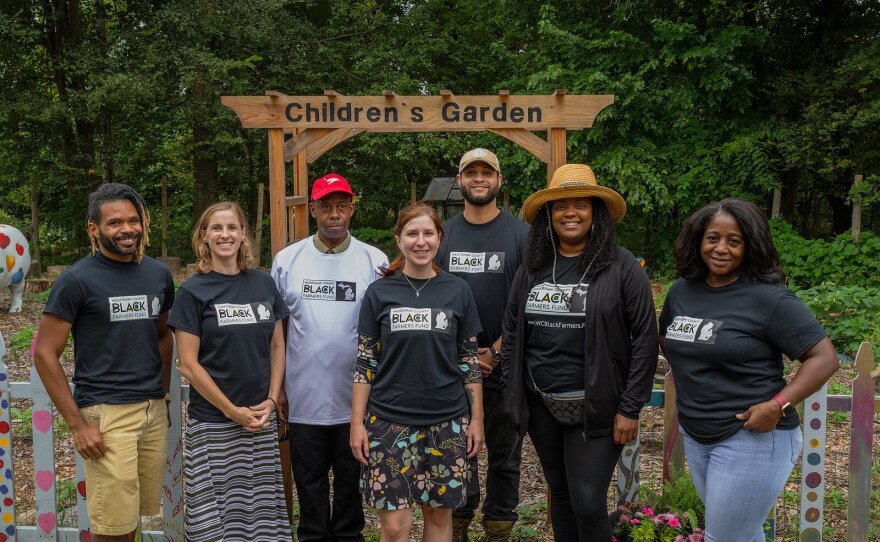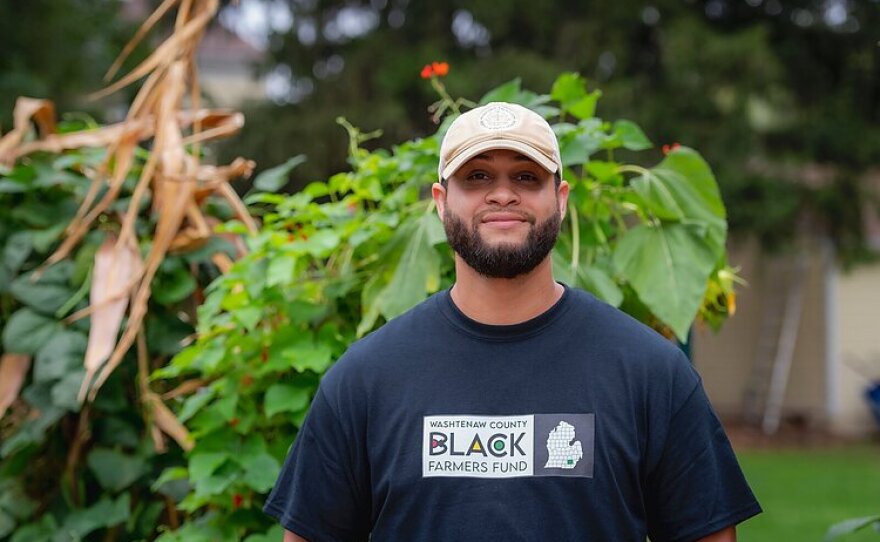WEMU's Lisa Barry and On the Ground Ypsi project manager Sarah Rigg talk with Keesa Johnson from the Washtenaw County Black Farmers Fund about efforts to encourage and support diversity in farming and why that's important.
Resources:
Sarah Rigg's Feature Article: New coalition aims to support Black farmers in Ypsilanti and throughout Washtenaw County
Washtenaw County Black Farmers Fund
Transcription:
Lisa Barry: You're listening to 89-1 WEMU, and this is On the Ground Ypsi, our weekly conversation with On the Ground Ypsi project manager Sarah Rigg, talking about one of her online Concentrate Media articles this week. This week, we're talking about a new coalition to support Black farmers in Ypsilanti and throughout Washtenaw County. And, Sarah, we begin the conversation with you, introducing our special guest for this segment.
Sarah Rigg: I brought with me Keesa Johnson, who is the leader of this coalition. And she's also the racial equality chair for the Washtenaw Food Policy Council.
Lisa Barry: Welcome, Keesa. Thanks for joining us.
Keesa Johnson: Thank you. Thank you for having me.
Lisa Barry: Who wants to begin by telling us more about this project called the Washtenaw County Black Farmers Fund?
Keesa Johnson: Yes. OK. So, the Washtenaw Black Farmers Fund will transform our community through food safety and land justice by investing in Black farmers, who have be long denied access to land and resources. And we wanted to shed some light on what's going on within our county.
Lisa Barry: How many Black farmers would you say there are in Washtenaw County?
Keesa Johnson: From a 2017 census data, it was between about 17. If you look at the data today, there were, like, 2,134 farmers who work and live with Washtenaw County. And from 2017-18, they identified as Black. So, as of right now, from my research that I've been doing, I've only been able to contact and be a contact maybe like six to seven.
Lisa Barry: Percentage-wise, what is that?
Keesa Johnson: I would say that is less than one percent. Look, I don't think it is a good percentage. We have two thousand one hundred and thirty four farmers, and we only have six to seven Black and brown families. I think that's a pretty small, significant number.
Lisa Barry: Tell us about the importance of this coalition and what you are hoping to communicate and achieve with the community.
Keesa Johnson: I want everyone to understand that, you know, there's a loss in diversity. There is a loss in creativity and innovation. We don't have Black farmers. We helped till this land. We helped create it. And so, we want people to understand that we, as a local community, create the society that we want to live in. And for us, starting this coalition, we're giving the power to the local community to say, like, this is the change that we want to see and we can do it collectively together and build a better, more inclusive, and equitable future together by addressing this type of issue. Because farming is a social justice issue.
Lisa Barry: Farming is a social justice issue. Tell me more about that, please.
Keesa Johnson: Well, yeah, well, here's the thing. I study equity in access and food systems for several years. I'm a graduate from the M-Desk program over at University of Michigan, and I've worked for quite some time with, like, Black visionaries in the food system. And from that, my study and my practice, you can trace every known oppression to man through the food system. But there's also great healing that could come from the land as well. And so, I think it's important for us because food is the first economy of any civilized society for us to make sure that we have a proper representation of people, of how the country looks, farming food for us.
Lisa Barry: Knowing that and knowing that it's 2021 and fewer than one percent of the farmers in Washtenaw County are Black, it seems like we might still have a lot of work to do.
Keesa Johnson: We all have a lot of work to do. I just assume with the coalition members that is this quote, "There is no end to what a living world would demand of you." We're in the living world. And so, certain demands of us to create the type of future together that we want to see, it's not just for our government to tell us, like, this is what a food desert is when it's really not a food desert. It's for us to look at something collectively, locally, together to determine that as a community together.
Lisa Barry: And it seems like the pandemic has really pointed out the need for us to be growing and creating and sourcing our own food.
Keesa Johnson: Oh, definitely. I mean, one thing that the pandemic has taught us is the importance of our food system. You can see now, you see, you know, everybody needs someone in the kitchen. Everyone needs someone serving food. The food system has been operating not in the optimal space or position for quite some time. They operate in very oppressively to the workers who till the land, from the immigrants, from our food service workers, from our health care providers. All of this has to be addressed, and the pandemic has showed us very well that we need to reimagine a new space together.
Lisa Barry: One of your coalition members is the founder of We the People Opportunity Farm, Melvin Parson. And maybe, Sarah, you can address this. I interviewed Melvin many, many years ago, and I still remember him saying he went to the Ann Arbor Farmer's Market and looked around at all the people selling produce and everything and didn't see anybody who looked like him. And this was several years ago.
Sarah Rigg: Yeah, that's a sentiment that came up several times when I was doing interviews for this. Julius Buzzard is with Growing Hope, an Ypsilanti-based nonprofit, and he also had a quote in a story about there's a stigma to having a relationship with the land. It's felt to be not a space for people who look like us. So, yeah, there's definitely seem to be a widespread sentiment.
Lisa Barry: And who else would you talk to for this week's article?
Sarah Rigg: I spoke to T.C. Collins, who is the founder of Willow Run Acres. He did some teaching on his farm. And I spoke to 2Marines co-founder Josh McAllister. That's an interesting nonprofit. He helped former military people kind of get soft skills for getting back into civilian life. And he wants to connect them with volunteer opportunities at various farms around the county. And I also talked to Lolita Nunn from the Fair Food Network, but there's several other coalition members. But those are the ones that I spoke to.
Lisa Barry: So, Keesa, where do we go from here? What would you like to see happen to change this narrative and change the situation?
Keesa Johnson: I would love people to continue to donate to the fund, volunteer, and support Black farmers on their farms or wherever they are in the farmer's market and support. Ask your local markets like, "Hey, do you have any Black farmers? I like to buy from them." I mean, just donate, support, and volunteer.
Lisa Barry: What about getting Black people to become farmers? Is that sort of an uphill battle?
Keesa Johnson: Oh, well, here's another systematic. When, you know, we start getting to the, you know, the agriculture education, you know, a lot of the Big Ten schools, the big ag schools, you know, they do have programs that set up agriculture, but it's mainly set up for white men. You really don't look and see a pathway for farming. And, yes, this is definitely one. I mean, I saw a pathway. Unfortunately, I had to come to University of Michigan in order for myself to see myself as a farmer, because I went to a big ad school, because I was given the choice and the opportunity to look at the school system. And I see the future through food and farming. And so, yeah, like this is a big pull for education, get people more connected to the ground. It's just more healthy for our environment--and our mental health as well--to actually understand how our food is grown, to actually feel the dirt, and put your feet on the land.
Lisa Barry: Keesa Johnson, Washtenaw County Black Farmers Fund, thank you. And Sarah Rigg from On the Ground Ypsi. Thank you both for talking to us here on 89-1 WEMU.
Sarah Rigg: Thanks, Lisa.
Non-commercial, fact based reporting is made possible by your financial support. Make your donation to WEMU today to keep your community NPR station thriving.
Like 89.1 WEMU on Facebook and follow us on Twitter
— Lisa Barry is the host of All Things Considered on WEMU. You can contact Lisa at 734.487.3363, on Twitter @LisaWEMU, or email her at lbarryma@emich.edu










